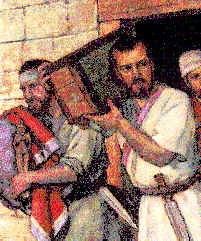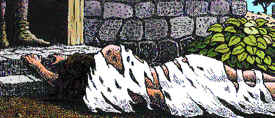The Bible: Judges: The Danites and Civil War
The Danites move north: Judges 17-18
The last five chapters of Judges relate two episodes that occurred early in the period of the judges. Both events illustrate an almost complete disregard for God’s law. One statement recurs frequently in these episodes: “In those days Israel had no king” (Judges 17:6; 18:1; 19:1; 21:25). Twice it is followed by the ominous addition: “Everyone did what was right in his own eyes” (Judges 17:6; 21:25, NKJV). Although the books of Samuel and Kings later show that a king was not the solution to Israel’s problems, the book of Judges assures us that Israel’s premonarchal history was no golden era either.
The first episode concerns an Ephraimite named Micah, who stole a large quantity of silver from his mother. When she pronounced a curse on whoever stole the silver, Micah confessed and returned the money. Supposedly dedicating the returned money to God’s use, Micah’s mother made an idol from the silver — something expressly forbidden by God’s law. Then Micah set up a shrine in his home and hired a Levite — a grandson of Moses — somehow thinking this would legitimize this pagan form of worship.
At this time, the Danites had been unable to drive out most of the inhabitants from the territory that had been allotted to them, so they looked to settle somewhere else. The Danites sent five warriors to scout out potential settlements. These scouts, who spent a night at Micah’s house during their travels, eventually found a suitable land, inhabited by unsuspecting locals, at Laish. The scouts reported back to the Danites, and much of the tribe decided to move there and invade.
 |
| The extent of Israel’s moral bankruptcy is laid bare in Judges 17–21. Theft, looting, idol worship, abuse of the priesthood, death threats and the slaughter of innocent people dominate these chapters. |
| The extent of Israel’s moral bankruptcy is laid bare in Judges 17–21. Theft, looting, idol worship, abuse of the priesthood, death threats and the slaughter of innocent people dominate these chapters. |
On the way, they passed by Micah’s house, where the scouts had previously spent the night on the way to Laish. The Danites seized all the household gods and told the Levite to be a priest for them instead. The Levite readily acquiesced. Micah, angry at what had happened, gathered some men together and pursued the Danites. But when the Danites refused to return the idols and threatened to attack him, Micah realized he was hopelessly outnumbered and gave up. The Danites successfully attacked the people of Laish, rebuilt the city and renamed it Dan. This city, about 100 miles north of the Danites’ allotted territory, was now the northernmost Israelite city.
Nobody in this entire episode was at all interested in following God’s ways. And yet the next episode is even worse.
Civil war: Judges 19-21
Another Levite, his concubine and his servant were traveling from Bethlehem toward the hill country of Ephraim. On the way, they stopped for the night in the Benjamite city of Gibeah, where only an Ephraimite resident offered them lodging. That night, some Gibeonite men pounded on the Ephraimite’s door, demanding he bring out the Levite so they could sexually abuse him. Gibeah had become like the city of Sodom, which God destroyed (Genesis 19).
To save themselves, the host and the Levite callously threw out the Levite’s concubine. The Gibeonites raped and abused the woman until dawn. When the Levite opened the door the next morning “to continue on his way” (Judges 19:27) and found his concubine lying on the threshold, his crass response reflected his own depravity: “Get up; let’s go” (verse 28).

Many scholars believe that the phrase “But there was no answer” (verse 28) implies that the woman was dead. Some disagree, claiming the Hebrew text is deliberately vague here, allowing for the possibility that the woman was still alive until the Levite dismembered her and then sent the body parts to the 12 tribes (verse 29) (see, for example, Meir Sternberg, The Poetics of Biblical Narrative, pp. 238-239).
When the other Israelite tribes heard of the Gibeonites’ sin, they demanded that the tribe of Benjamin hand over the guilty men for execution. The Benjamites refused. The resulting civil war between Benjamin and the other 11 tribes ended with heavy casualties on both sides. The tribe of Benjamin was virtually annihilated (Judges 20:46-48). Regretting their actions, the Israelites strove desperately to find some way to preserve the tribe of Benjamin. They eventually resorted to the dubious means of killing the men of Jabesh Gilead (who had refused to fight against Benjamin) along with their wives and children. They spared only the virgin women of the city, and gave them to the surviving Benjamites. Those Benjamites still without wives kidnapped, with the Israelites’ approval, young women from Shiloh.
These last five chapters of Judges are a catalog of the sins God warned against. They illustrate dramatically the inevitable penalties — the suffering, heartache and misery — of sin.
God’s Faithfulness |
||
|
The period of the judges — “Israel’s iron age,” as it has been called (in a spiritual, not economic, sense) — was a period of adaptation to the conditions of life in Canaan, a period of struggle for national survival. If we were restricted to the book of Judges, the struggle might appear foredoomed to defeat; how defeat was turned into victory is told in the sequel, in the books of Samuel. Religiously, [Judges] is presented as a period during which the nation was being fashioned by its God in the furnace of affliction to be His chosen instrument for the furtherance of His purpose in the world. Unedifying as the details of many of the individual episodes may be thought, together they portray the God of Israel’s unceasing faithfulness to His covenant with His people, in spite of their recurrent unfaithfulness, as He deals with them in mercy and judgment, showing them what is practically involved for them in being His people and having Him as their God. Later generations looked back to the period of the judges as one during which God acted signally for the defence of His people. Thus Samuel, in his farewell address to Israel, reminds them how God….” sent Jerubbaal and Barak….and delivered you out of the hand of your enemies on every side; and you dwelt in safety” (1 Samuel 12:8-11). Other incidents in the period of the judges are referred to in 2 Samuel 11:21; Isaiah 9:4; 10:26. But the most outstanding tribute to the men of this period is paid in Hebrews 11:32ff., where “Gideon, Barak, Samson, Jephthah” are named among those who “through faith conquered kingdoms, enforced justice, received promises,…escaped the edge of the sword, won strength out of weakness, became mighty in war, put foreign armies to flight” (F.F. Bruce, “Judges,” in The Eerdmans Bible Commentary, 3rd ed., pp. 254-255). |
The book of Judges closes with the words “all the people did what was right in their own eyes” (Judges 21:25, NRSV). Is this happening today, too?

